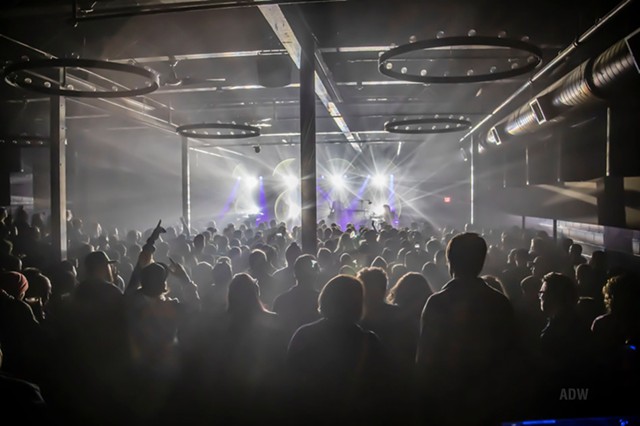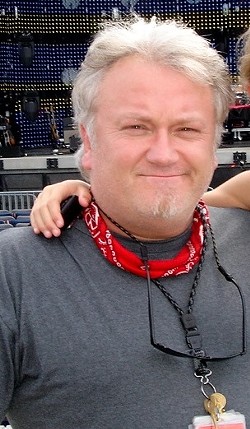
[ad_1]
In his four decades of working in the music business, Quake Mark says he’s had a gun pulled on him three times, he’s been shot once, stabbed twice, overdosed once, been in three bus crashes, four bus fires and has survived two plane crashes, including with the Goo Goo Dolls in 1999 when the band’s plane skidded off a runway in Italy.
But this coronavirus pandemic could be the end of his career as a sound technician, production manager and tour manager, “which is a fancy way of saying I’m a very high-priced roadie,” says Quake.
(Don’t call him Tim, he says; that’s what the IRS calls him. To everyone, he’s Quake.)
He’s one of those guys you catch fleeting glimpses of during a concert, darting around behind the band, wearing black so as to not be easily seen. Quake should be on the road now with a Stone Temple Pilots tour, but instead he’s at his home in Charlotte.
“We were the first to close, we’re gonna be the last ones to come back,” Quake says of the entertainment business. “We’re also seeing the core of the industry collapse, because there’s just no work.”
It took less than two weeks for Quake and a loose-knit group called We Make Events to create a nationwide movement — just a moment, really — called Red Alert Restart. A collection of more than 1,500 concert venues, bars, restaurants, private homes, and all manner of businesses related to the entertainment industry, from Madison Square Garden to the Capitol Records building in Los Angeles.
Then at 9 p.m. Tuesday, they threw the switch, illuminating those buildings in red light. Red Alert Restart continued for three hours. The plan was to flood social media with photos of those crimson buildings, as a show of support for the Restart Act, which has been stalled in Congress. That legislation would provide assistance to people in the entertainment industry who have lost their livelihood.
Quake was We Make Events’ regional director for western New York. In Rochester, he and cohorts such as Tony Gross of GFI Music in Ontario signed on The Little Theatre, the Rochester Music Hall of Fame on Gibbs Street, Bausch & Lomb, Xerox, the Rochester Riverside Convention Center and an outdoor stage at Rochester Institute of Technology.
Red Alert Restart was to be a peaceful, creative protest, Quake says. That’s a relief in a simmering summer of COVID-19, Black Lives Matter, people with AK-47s showing up at protests and a suddenly unstable election process coming up in November, not to mention ongoing concerns about climate change.
Quake was born and raised in Batavia. He’s lived in Buffalo, Austin and Los Angeles, and he and his wife moved to Rochester in 2000. Over all of that time, his job has taken him to 49 states and 58 countries.
Aside from the knives and plane crashes, Quake’s résumé includes working with The Cars, Phil Lesh and Friends, the Dave Matthews Band, Tracy Chapman, and Jane’s Addiction, with a particularly strong relationship with the various side projects of Guns N’ Roses guitarist Slash. Slash recorded a public service announcement for Red Alert Restart. So did Butch Patrick, who played Eddie Munster on “The Munsters.” Make of that what you will.
Quake says Red Alert Restart’s three main goals are to raise awareness of people who have lost work in the entertainment industry, push the paycheck-protection-minded Restart Act, and extend unemployment.
It’s not about making sure Slash has pocket money. It’s about the struggling business that won’t make it through the coronavirus pandemic without federal support. It’s about the 77 percent of the people in the live events business who have lost 100 percent of their income, according to the estimate by We Make Events.
Before the pandemic, 12 million people were working live-events jobs in this county. That’s not just musicians. The 95 percent of live events canceled in the United States this year has had a domino effect, Quake says. It affects wedding caterers, bartenders, concert venue vendors, tour-bus drivers and a “high-priced roadie” like Quake.
“There is no work,” Quake says. “A guy like me, I’ve been doing this for 40 years. What’s available for me out there to go and do? Yeah, I could stand at the doorway and go, ‘Yes, here’s your cart, thank you for shopping at Walmart.’ Or I could be in the drive-through window and say, ‘Would you like fries with that?’
“It’s not gonna keep my house. And it’s not gonna keep my family fed.”
When he’s busy, Quake says he’s out of town eight to 10 months of the year. Seventy-five percent of his business is outside the United States. But, “We’re not allowed to leave the country now,” he says. “Other countries just won’t let us in.”
Much of the world sees the United States as a coronavirus breeding ground. There’s been no coordinated effort among the states, Quake says. The fight against the virus has been “a hodgepodge.” Information is contradictory, the facts change daily, leading to the building of hopes that soon crumble.
“I’ve got a tour with Todd Rundgren that was, it’s been moved five times,” Quake says.
He was talking to someone who works for Live Nation, the giant promoter that books venues such as Darien Lake Performing Arts Center. “He said people just don’t have money to spend on tickets because there are so many people unemployed, or underemployed, that they just don’t have disposable income.
“This is the first time in history, in history, that the entertainment industry has been rendered useless. And it’s kinda scary.”
Personally scary for Quake. He’s an independent contractor; bands hire him for a tour, then he’s done. The Rochester Music Hall of Fame brings him in to do the sound for its yearly concert in Kodak Hall at Eastman Theatre. Which was canceled this year, so no paycheck there.
As an independent contractor, he has no health insurance from an employer. He had to build his own retirement fund. And he lost $100,000 of that in the 2008 recession. His wife is a seasonal employee at a lawn and garden store. That work goes away soon.
“I’m a poster child for don’t let this happen to you,” Quake says. “I don’t know … I don’t know where this is going to take me.”
And he worries about where this is going to take us. Quake recalls a Zoom meeting he attended earlier this year with a few thousand people who work in the concert industry. The guy who books Metallica and Def Leppard issued a warning: Don’t look for 2021 to be much different.
“He said, ‘We’re all talking about running into a building that’s on fire,’ ” Quake says. “ ‘And we need to wait until the building’s not on fire anymore, and the fire department tells us it’s OK to go in.’ ”
Jeff Spevak is WXXI’s arts and life editor and reporter. He can be reached at jspevak@wxxi.org.
[ad_2]
Source link


